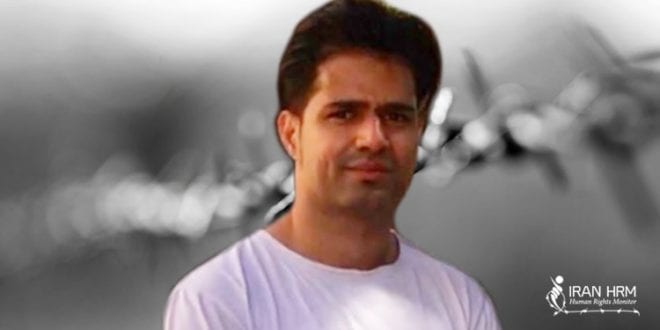Iranwire – The death of Behnam Mahjoubi, a Gonabadi dervish and prisoner of conscience, took place after he had been hospitalized in Razi Psychiatric Hospital, known as Aminabad. IranWire has now learned of several detainees have been transferred transferred secretly to psychiatric hospitals without undergoing an interview or clinical examination, on the orders of security officials or a court.
***
Behnam Mahjoubi was jailed in June 2020, and in October the Gonabadi dervish was transferred from Evin Prison to Aminabad Psychiatric Hospital for a second time. Mahjoubi’s family and a number of dervishes went on a hunger strike to express support for him.
Evin Prison staff claimed they sent Mahjoubi to the hospital because he had suffered a panic attack that could have led to the temporary shutdown of some of his organs. However, Mahjoubi reported mental and physical abuse at the hospital. Staff urinated on him, tied his hands and feet to the bed and injected him with unknown substances. It was also not the first time a political prisoner in Iran had been transferred to a psychiatric hospital and abused in this way.
Danial Estakhr, a lawyer, says multiple prison doctors are ostensibly required to make the decision to refer a prison inmate to hospital: “According to the regulations of the Prisons Organization, to send a prisoner to hospital, a committee of three to five doctors from the same prison should be formed. This committee is formed after the issuance of a doctor’s prescription stating the need to send the prisoner to hospital.
“Unfortunately in many cases, the committee’s physicians are security personnel who are guided by security interests in their decision-making rather than medical practice. Thus, breaking the prisoner’s morale and resistance becomes one of the important goals of these committees, and as a result, a young man who is sent to the hospital will have to endure his suffering in prison for a long time. The aim is to break their morale and depict political and ideological prisoners as mentally ill people, many of whom, although they do not need to be admitted to a psychiatric hospital, are forcibly admitted to these hospitals by the decision of the same prison doctors.”
Secret Hospitalization of Political Prisoners
In an interview with IranWire, a psychiatrist at a hospital in Mashhad spoke about the conditions in which political prisoners are admitted to medical centers. All patients at the hospital are examined and triaged in the emergency department or the outpatient clinic. After consulting with the patient, the doctors speak to his or her family and relatives.
In addition to patients who are interviewed and clinically examined, others are “confidentially” transferred to these hospitals. An assistant at a psychiatric hospital in Tehran says these patients are usually referred to hospital with a court order: “Some other patients are confidential clients; in principle, no one from the hospital staff is informed about their identities or files, and no one is allowed to visit them. They are in the hospital for a while and then they are discharged without anyone being informed. These people are usually taken to the hospital under the protection of the security agencies, and the same agencies prevent hospital staff from accessing them.”
The experience of Hashem Khastar, a teachers’ union activist, at the Ibn Sina Psychiatric Hospital in Mashhad was slightly different to that of many political activists who are sent to these facilities from prison. A few days after Khastar’s hospitalization in October 2018, when the media protested, the intelligence services tried to force the hospital’s doctors and even psychiatrists outside the hospital to issue a certificate of illness for him, which they refused to do.
Khastar’s forced hospitalization and the abuse he endured sparked protests by human rights organizations. The teachers’ rights activist entered the men’s ward directly without any examination and was forced to wear a hospital gown.
Sedigheh Maleki, the wife of the political prisoner, told IranWire about the officials’ restrictive behavior at Ibn Sina Psychiatric Hospital as her husband was forcibly admitted: “The level of control of Khastar by security agents was such that when my husband wanted to go out of the room on the first day to use the toilet, the security guards did not allow it, and forced him to defecate in the same room. On the third day of Khastar’s hospitalization, when I was allowed to see him due to media pressure, a man in a white medical uniform sat in the room where Khastar was hospitalized and said ‘I must oversee what is exchanged between you.’ We didn’t know if this person was a hospital staff member, or an intelligence officer wearing a doctor’s uniform.
“Intelligence agents intimidated the hospital staff to the point that they didn’t say a word to me, although I visited them many times,” she added. “The director of Ibn Sina Hospital, who was a woman [Dr. Fatemeh Moharreri], repeatedly refused my request to speak to her. Later, when an agent from the Mashhad intelligence service came to contact my husband, he said that we have our forces in all departments and institutions, including hospitals, and we can carry out our job.”
We asked Maleki if the staff at Ibn Sina Psychiatric Hospital were aware of Khastar’s hospitalization. “A psychiatric student who was working there when Khastar was at Ibn Sina Hospital later told us that everyone was threatened with dismissal if they talked about him,” she said. “This person said the psychiatry professors who worked in that hospital often knew who Khastar was, but they were not allowed to talk about it at all. We were even informed that the Iranian Psychiatric Association objected to this process in a letter to the then minister of health, and the minister wrote a letter asking for Khastar’s condition to be investigated.”
The security agencies and courts have also been known to use the excuses of suspected addiction or violent behaviour to force political activists into psychiatric hospitals.
 Shabtabnews In this dark night, I have lost my way – Arise from a corner, oh you the star of guidance.
Shabtabnews In this dark night, I have lost my way – Arise from a corner, oh you the star of guidance.



